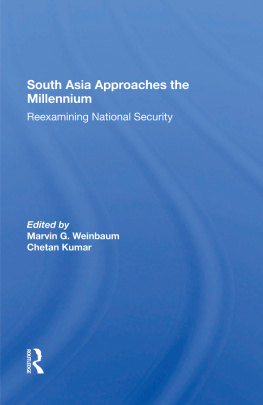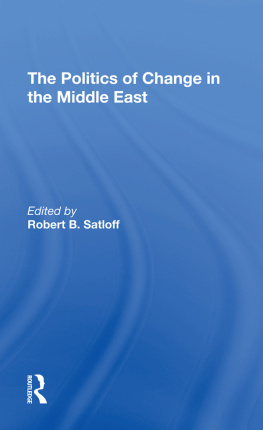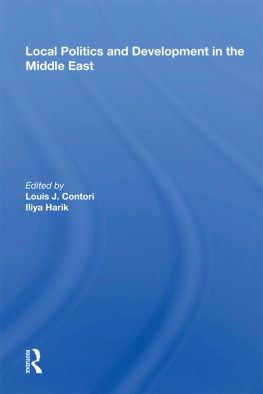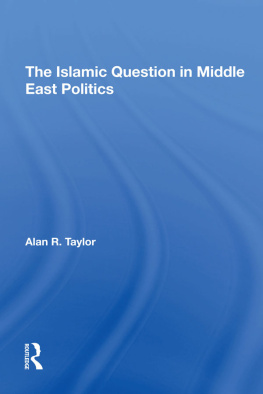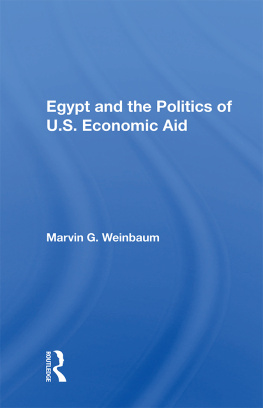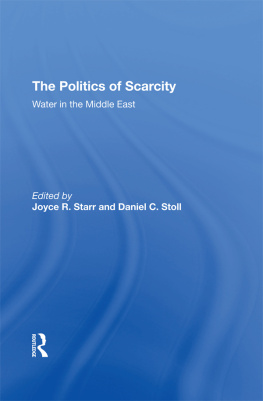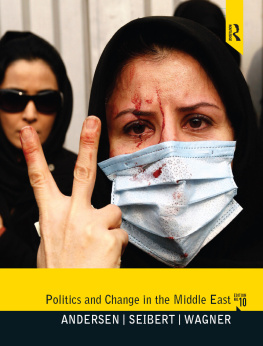ROUTLEDGE LIBRARY EDITIONS:
POLITICS OF THE MIDDLE EAST
Volume 11
FOOD, DEVELOPMENT, AND
POLITICS IN THE MIDDLE EAST
FOOD, DEVELOPMENT, AND
POLITICS IN THE MIDDLE EAST
MARVIN G. WEINBAUM
First published in Great Britain in 1982 by Croom Helm Ltd
This edition first published in 2016
by Routledge
2 Park Square, Milton Park, Abingdon, Oxon OX14 4RN
and by Routledge
711 Third Avenue, New York, NY 10017
Routledge is an imprint of the Taylor & Francis Group, an informa business
1982 Marvin G. Weinbaum
All rights reserved. No part of this book may be reprinted or reproduced or utilised in any form or by any electronic, mechanical, or other means, now known or hereafter invented, including photocopying and recording, or in any information storage or retrieval system, without permission in writing from the publishers.
Trademark notice: Product or corporate names may be trademarks or registered trademarks, and are used only for identification and explanation without intent to infringe.
British Library Cataloguing in Publication Data
A catalogue record for this book is available from the British Library
ISBN: 978-1-138-83939-7 (Set)
ISBN: 978-1-315-68049-1 (Set) (ebk)
ISBN: 978-1-138-92313-3 (Volume 11) (hbk)
ISBN: 978-1-315-68527-4 (Volume 11) (ebk)
Publishers Note
The publisher has gone to great lengths to ensure the quality of this reprint but points out that some imperfections in the original copies may be apparent.
Disclaimer
The publisher has made every effort to trace copyright holders and would welcome correspondence from those they have been unable to trace.
Food, Development, and Politics in the Middle East
Marvin G. Weinbaum
This volume is included in Westviews Special Studies on the Middle East.
All rights reserved. No part of this publication may be reproduced or transmitted in any form or by any means, electronic or mechanical, including photocopy, recording, or any information storage and retrieval system, without permission in writing from the publisher.
Copyright 1982 by Westview Press, Inc.
Published in 1982 in the United States of America by
Westview Press, Inc.
5500 Central Avenue
Boulder, Colorado 80301
Frederick A. Praeger, President and Publisher
Published in 1982 in Great Britain by
Croom Helm Ltd.
2-10 St Johns Road
London SWll
Library of Congress Catalog Card Number: 81-16098
ISBN (U.S.): 0-89158-947-3
ISBN (U.K.): 0-7099-2726-6
Printed and bound in the United States of America
To my wife, Francine
Contents
Strains on the international monetary system and the unbalancing of budgets in the industrialized West and the Third World are largely credited to the exercise of economic power by the Middle Easts oil-exporting countries. States of that region, including the less prosperous, also share heavy responsibility for a challenge of another kindto global food security. With the new affluence of principal oil-producing countries after 1973 and the steep increase in food consumption from Morocco to Pakistan, the Middle East has emerged as a leading competitor for the worlds food stocks and foreign assistance. Countries that only a decade or two ago were self-sufficient or showed a favorable net food trade now turn to international markets as their domestic food production lags behind an accelerating demand. Government projects and programs designed during the 1970s to close the wide gap between domestic supplies and consumption have succeeded instead in increasing reliance on imported technologies and in more closely integrating countries into a world economy. Although capital reserves drained off for food imports have not neutralized the influence acquired from oil wealth, even the regions richest states have become uneasy about their food dependence and potential economic vulnerability. Among the Middle Easts poorer states, heavy financial burdens and lowered selfreliance have slowed development and threaten economic independence.
The Middle East mirrors most of the problems of food production and conditions of rural poverty faced throughout the less developed world. Despite distinctive institutions and copious oil revenues that permit high-cost solutions, the region resembles most of the Third World in its limited ability to sustain effective and profitable agricultural systems. Behind the rising food imports is a legacy of decades of low agricultural productivity and public policies that slighted the rural sector. As elsewhere, large segments of the regions labor force remain engaged in agricultural pursuits, and the vast majority of farmers cultivate the land by traditional means. Scarce farm inputs, inappropriate technologies, and weak producer incentives contribute to low productivity, and the remedies sought through improving rural incomes and ensuring adequate public investments and services are familiar ones. Much as in other regions, agrarian reform and balanced sectoral policies in the Middle East may be impossible without structural changes and redistribution of income and power. Yet progress, or the lack of it, by Middle East governments in managing food problems and rural development is likely to have, aside from the expected bearing on the quality of rural and urban life, a unique impact on a dwindling world food reserve and conditions for global economic and political stability.
The following study of food and agricultural policies in the Middle East is framed by the view that constraints on production and major obstacles to developmentfamiliarly described as physical and technological or conceived in economic and social termsare also inescapably political. Although political factors are very likely no more relevant in the Middle East than elsewhere, the imprint of politics on the region is unmistakable and sometimes profound. Factional fighting in Lebanon or Turkey, a war between Iran and Iraq, Soviet armed intervention in Afghanistan, and the enduring Arab-Israeli struggle are only the more dramatic events that have had a bearing on food production and distribution and on hopes for agricultural development. Regional conflict and domestic instability disrupt programs, divert resources, and distract policymakers. On a more continuous basis, political cultures and institutions, political ideologies and interests contribute to shaping policies and determining how they are executed. Frequently, seemingly technological choices in development in fact incorporate political values and priorities. Government food strategies supposedly dictated by economic imperatives may actually be the price exacted by ascendant domestic interests. And what is so often described as societal resistance to programs can be found to be the result of bureaucratic conflict, confusion, and lethargy.
Government actors plainly dominate the formulation of food strategies and planning for agricultural modernization. Price guarantees, input subsidies, import and export regulations, and public investments are, with other policies, the instruments of public officials and their legions. Their decisions, frequently political, have a direct bearing on farmers planting choices, use of inputs, and incentives to produce. The private sector often shares responsibility for investment and is, in some cases, nurtured by government policies. But in the Middle East the public sector is expected to finance the lions share of agricultural expansion and improvement and to satisfy demands from the countryside for increased economic and social equity. Government alone possesses the legitimacy and resources necessary to overcome entrenched interests that stand in the way of fundamental change. Because the stakes in agricultural and food policy decisions at times are nothing less than a regimes survival, few policies are likely to escape the test of how they alter configurations of national and local political power and privilege.





